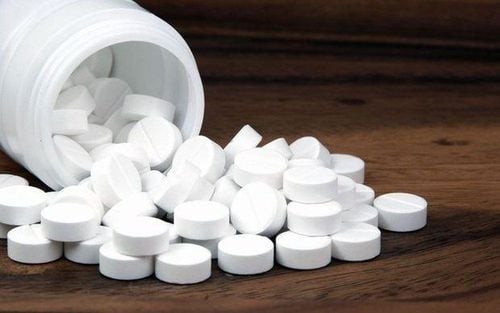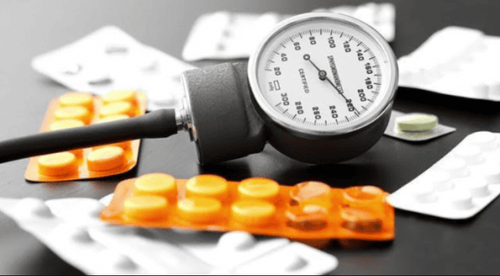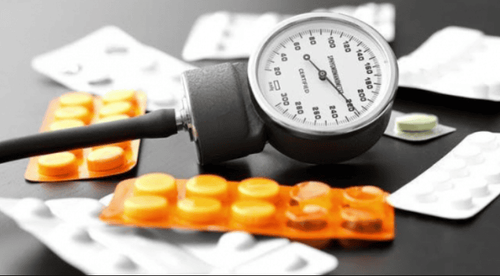This is an automatically translated article.
Diuretics help remove sodium and water from the body. The result of this action is to cause the kidneys to excrete more sodium into the urine. The sodium then draws water from the blood which reduces the circulating volume, thereby lowering blood pressure. Diuretics are used effectively in the treatment of hypertension, and are often prescribed because of their effectiveness, low cost, and few side effects.
1. Indications of diuretics to treat hypertension
Diuretics are known for their ability to increase urine formation and excretion. The increase in excretion allows more water and sodium to be eliminated, and ultimately affects the vascular system by reducing fluid volume.
The decrease in fluid volume directly affects blood pressure, which is why diuretics lower blood pressure.
For a long time, treatment of hypertension using diuretics has been effective in preventing stroke and heart disease. In clinical trials, most hypertension, especially African Americans, can be well controlled with a simple 2-drug regimen that combines a thiazide diuretic with a β-blocker or ACE inhibitors, each taken once daily. Lowest cost, high rate of control and drug adherence are probably the outstanding advantages achieved for the indications of diuretics for the treatment of hypertension.

Thuốc lợi tiểu được biết đến với khả năng làm tăng sự hình thành và bài tiết nước tiểu
2. Pharmacodynamics of diuretics
There are 3 different classes of diuretics, including thiazide diuretics, loop diuretics and potassium-sparing diuretics with the main site of action of diuretics being the nephron in the kidney. Different classes of diuretics are characterized by different mechanisms of action and specific sites targeted in the nephron.
Thiazide diuretics act on the distal nephron by inhibiting sodium reabsorption. With this inhibition, more sodium in the nephron creates an osmotic force that allows water retention in the nephron, and ultimately water excretion. Thiazide diuretics are considered by many physicians to be the drug of choice for the long-term treatment of hypertension.
Loop diuretics, like thiazide diuretics, inhibit sodium as well as chloride reabsorption by targeting the sodium potassium chloride co-transporter, however they exert their effects in the extremities. up of the loop of Henle. By targeting these 2 specific electrolytes, loop diuretics prevent water reabsorption. The decrease in plasma volume that occurs in response to increased sodium excretion reduces venous return and decreases cardiac output.
Potassium-sparing diuretics are used only in the treatment of congestive heart failure, not in the treatment of hypertension.
3. Pharmacokinetics of diuretics
All classes of diuretics are orally absorbed and widely distributed. Thiazide diuretics are known to bind extensively to plasma proteins, limiting filtration and promoting proper distribution to tissues. However, they undergo extensive metabolism in the liver which affects the dose and frequency of use. The half-life of thiazides is approximately 8 to 12 hours allowing for a single daily dose.
On the other hand, loop diuretics are known to be less effective than thiazides and have a short duration of action of about 6 hours. Loop diuretics are indicated for blood pressure control in patients with concomitant renal or heart failure, in cases when thiazide diuretics are rarely effective.

Thuốc lợi tiểu có vai trò rất quan trọng và nhiều mặt trong điều trị tăng huyết áp nói riêng, các bệnh lý tim mạch nói chung
4. Side effects of diuretics in the treatment of hypertension
Adverse effects of diuretics are dose dependent and primarily metabolic. The most common adverse events were electrolyte imbalances such as hypokalemia or hyponatremia and excessive fluid withdrawal. Of these, hypokalemia is one of the main problems with diuretics and can cause serious metabolic and heart problems. At the same time, excessive volume depletion can lead to reflex increases in cardiac output and vascular resistance due to activated peripheral receptor reflex. The increased oxygen demand at the heart can become a problem for patients, especially those with ischemic heart disease.
Other side effects associated with diuretics are orthostatic hypotension and hyperlipidemia. In addition, diuretics are also contraindicated in patients diagnosed with gout due to their potential to increase uric acid levels in the blood.
In summary, diuretics have a very important and multifaceted role in the treatment of hypertension in particular, cardiovascular diseases in general, can achieve the most benefits. The combination of diuretics and other antihypertensive agents can provide highly effective BP control, making it a quasi-optimal therapy for certain populations, such as patients with chronic renal failure. , and may be considered more frequently indicated in the treatment of hypertension.
Please dial HOTLINE for more information or register for an appointment HERE. Download MyVinmec app to make appointments faster and to manage your bookings easily.
References: ncbi.nlm.nih.gov, physio-pedia.com, healthline.com












